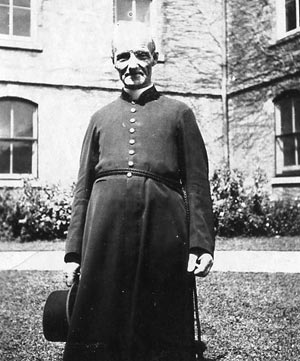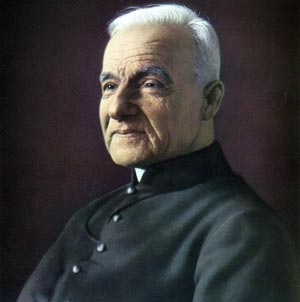
André was pious without being pretentious. He was direct in speech—even with religious superiors and bishops—without being disrespectful. He was obstinate, one might say stubborn, yet always obedient to legitimate religious authority. He was humble without being subservient. He was simple, though not a simpleton. He was a man of profound faith, wisdom and compassion for those who suffered. He was fearless in speaking truth to power.
This is not to say André was perfect. He was a man; ergo, a sinner. One does not have to scrutinize his life vis-à-vis his better biographers to find an André who had a wee bit of a temper; who was at times more than a little impatient, especially with those, who with little else to do, came shopping for a miracle to tell their friends about; and who was a tad less agreeable with attention-seekers and self-aggrandizers.
Learn more about the life of St. André Bessette
He clearly became frustrated, especially when people spoke of “his miracles”—his power of healing. When he heard cures being attributed to him, he exclaimed with a face flushed in anger, “What a lie! What an insult! Saint Joseph does all of this. I’m an illiterate man, a sick man. Saint Joseph is strong and powerful.” (It should be fully understood, that his outburst was not a “false humility” so many of us a tempted to employ. André was clearly angry with such a misappropriation of credit.)
André was extraordinary in that he was so ordinary, at least that is how he saw himself.
He shunned praise. Whether performing his obedience as porter for the college or tending to the suffering, he ministered with unstinting devotion. Both were important to him because they were important in the eyes of God. Too, he had a keen wit and sense of humor. He thoroughly enjoyed laughing with his friends and confreres, one of whom was (Servant of God) Brother Flavian LaPlante, C.S.C. Too, he often joked and “shadow-boxed” with children to alleviate their disquietude. In short, André trod Mount Royale with both feet solidly planted.

If much has been written about André’s sanctity and actions, too infrequently mentioned is his mission. He spent his religious life devoted to promoting the role of Saint Joseph as patron of, and intercessor for, the Church Universal. This was indeed the ministry of most import for André: While he shared a friendship with Saint Joseph since early childhood, it seems no co-incidence Alfred Bessette became Brother André in the Congregation of Holy Cross in 1870, the same year Pope Pius IX proclaimed Saint Joseph patron of the Universal Church. Too, it seems providential that he was given the religious name of André—the name of the first Brother of Holy Cross, originally Brother of St. Joseph of Ruille, who had a great devotion to Saint Joseph.
If saints can be disappointed, and as they are human there is little reason to doubt this, André might well experience some disappointment, some lack of closure in his mission. It seems that St. Joseph is largely ignored by a majority of the Church. Then again, he may well not be disappointed but still working tirelessly to promote a strong friendship between his powerful friend and the people of God.

Finally, it might have been observed by some that our brother André has never been referred to as “Saint André” in this reflection. It was done purposefully: It might well be assumed André eschews the title because it makes him the “go-to guy” rather than our patron, Saint Joseph. At any rate, the lack of said honorific is not meant as a slight; rather to pay tribute to our brother, most worthy to be honored as a saint.
This reflection for the Feast of St. André Bessette, the first canonized saint of the Congregation of Holy Cross, was written by Br. John Tryon, C.S.C., who currently is serving as the Assisant Novice Master at the Holy Cross Novitiate in Huaycán, Peru.
Quotations have been taken from "The Collection of Suitcases" by Afonso de Santa Cruz.